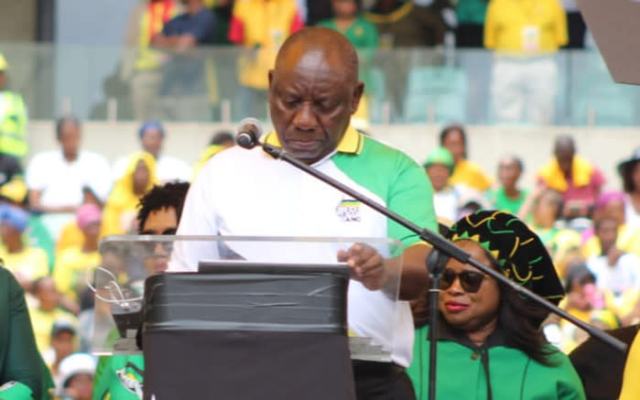In a move that has sparked controversy and public outrage, the Presidency of South Africa has recently announced the approved salary hikes for ministers, deputy ministers, members of parliament, and other legislators in the country. The increases, which come into effect retroactively from 1 April 2024, amount to a mere 2.5%, falling significantly below the inflation rate.
While the salary hikes may seem modest at first glance, it is important to note that South Africa's cabinet ministers and parliamentarians are already bona fide millionaires. This revelation has intensified the backlash, as taxpayers are left questioning why these wealthy individuals are receiving further financial benefits.
The total annual package for these esteemed officials includes various components. Firstly, there is a basic salary component equal to 60% of the total, which constitutes the pensionable salary. Additionally, there is a yearly allowance of R120,000, which is included in the basic salary but does not reflect on the IRP 5 certificate, effectively making it a tax-free benefit. Furthermore, an employer's pension benefit contribution equal to 22.5% of the pensionable salary is provided. Lastly, there is a flexible portion allocated for the remaining amount of the total package.
These salary elements apply to all the listed positions, from cabinet ministers to members of the National Assembly. However, it is the salary hikes for cabinet ministers that have drawn the most criticism. Not only do these millionaires receive substantial salary increases, but they also enjoy an array of tax-free benefits and perks, all funded by the South African taxpayer. These benefits include luxury vehicles, lavish homes, and exorbitant amounts spent on private VIP security. Critics argue that this is an unjustifiable use of public funds, particularly when many portfolios under these ministers' control are struggling or performing poorly.
The recent salary adjustments now place South Africa's cabinet ministers at an annual income of R2.69 million, up from R2.64 million. Deputy ministers will receive an increase to R2.22 million, up from R2.16 million, while the deputy president's salary will climb to R3.16 million. These figures further contribute to the public's concern regarding the growing wealth gap and income inequality.
It is not only the executive members who will benefit from these salary hikes. Members of the National Assembly, across all represented parties, will also see their salaries increase. The Speaker of the National Assembly and the Chairperson of the National Council of Provinces will earn on par with the deputy president, receiving an annual income of R3.16 million. Ordinary members of parliament will now earn R1.27 million per year, and opposition party leaders and their whips will also enjoy considerable salary bumps.
The makeup of parliament has undergone significant changes following the 2024 elections. The African National Congress (ANC) has lost 71 seats in the National Assembly, resulting in a collective loss of R90 million in salaries for the party. In contrast, the MK Party, making its debut, has secured 58 seats and will receive R70 million in salaries.
These salary hikes have ignited a heated debate throughout South Africa. Many argue that the increases are unjustifiable, given the economic challenges faced by the country, including high unemployment rates and widespread poverty. Critics call for a more equitable distribution of resources and a reevaluation of the financial benefits enjoyed by the political elite.
As South Africans grapple with the implications of these salary hikes, one thing remains clear: the public's frustration and disappointment continue to grow as the wealth gap widens and the economic struggles persist.
The full salary hikes can be seen below:
Deputy president, ministers and deputy ministers 2024/25
| Position (Pay level 1, effective from 1 April) | 2023/24 | 2024/25 |
| Deputy President | R3 087 467 | R3 164 654 |
| Minister | R2 624 329 | R2 689 937 |
| Deputy Minister | R2 161 190 | R2 215 220 |
Members of the National Assembly and NCOP 2022/23
| Position (Pay level 1-2, effective from 1 April) | 2023/24 | 2024/25 |
| Speaker: NA | R3 078 467 | R3 164 654 |
| Chair: NCOP | R3 078 467 | R3 164 654 |
| Deputy Speaker: NA | R2 161 190 | R2 215 220 |
| Deputy Speaker: NCOP | R2 161 190 | R2 215 220 |
| House Chair | R2 057 045 | R2 108 472 |
| Chief Whip: Majority Party | R1 748 874 | R1 792 595 |
| Chief Whip: NCOP | R1 748 874 | R1 792 595 |
| Parliamentary Counsellor: President | R1 748 874 | R1 792 595 |
| Parliamentary Counsellor: Deputy President | R1 748 874 | R1 792 595 |
| Leader of Opposition | R1 748 874 | R1 792 595 |
| Committee Chair | R1 634 452 | R1 675 314 |
| Deputy Chief Whip: Majority Party | R1 471 064 | R1 507 841 |
| Chief Whip: Largest Minority Party | R1 471 064 | R1 507 841 |
| Leader of Minority Party | R1 471 064 | R1 507 841 |
| Whip | R1 365 074 | R1 399 201 |
| Member of National Assembly | R1 243 450 | R1 274 536 |
| Permanent Delegate of the NCOP | R1 243 450 | R1 274 536 |
Premiers, MECs and Members of Provincial Legislatures
| Position (Pay level 1-3, effective from 1 April) | 2023/24 | 2024/25 |
| Premier | R2 470 010 | R2 531 760 |
| Member of Executive Council | R2 161 190 | R2 215 220 |
| Speaker | R2 161 190 | R2 215 220 |
| Deputy Speaker | R1 748 874 | R1 792 595 |
| Chief Whip: Majority Party | R1 634 452 | R1 675 314 |
| Committee Chair | R1 471 067 | R1 507 844 |
| Leader of Opposition | R1 471 067 | R1 507 844 |
| Deputy Committee Chair | R1 384 012 | R1 418 612 |
| Deputy Chief Whip: Majority Party | R1 384 012 | R1 418 612 |
| Chief Whip: Largest Minority Party | R1 384 012 | R1 418 612 |
| Leader of Minority Party | R1 384 012 | R1 418 612 |
| Parliamentary Counsellor to King/Queen | R1 243 450 | R1 274 536 |
| Whip | R1 243 450 | R1 274 536 |
| Member of Provincial Legislature | R1 203 473 | R1 233 560 |











